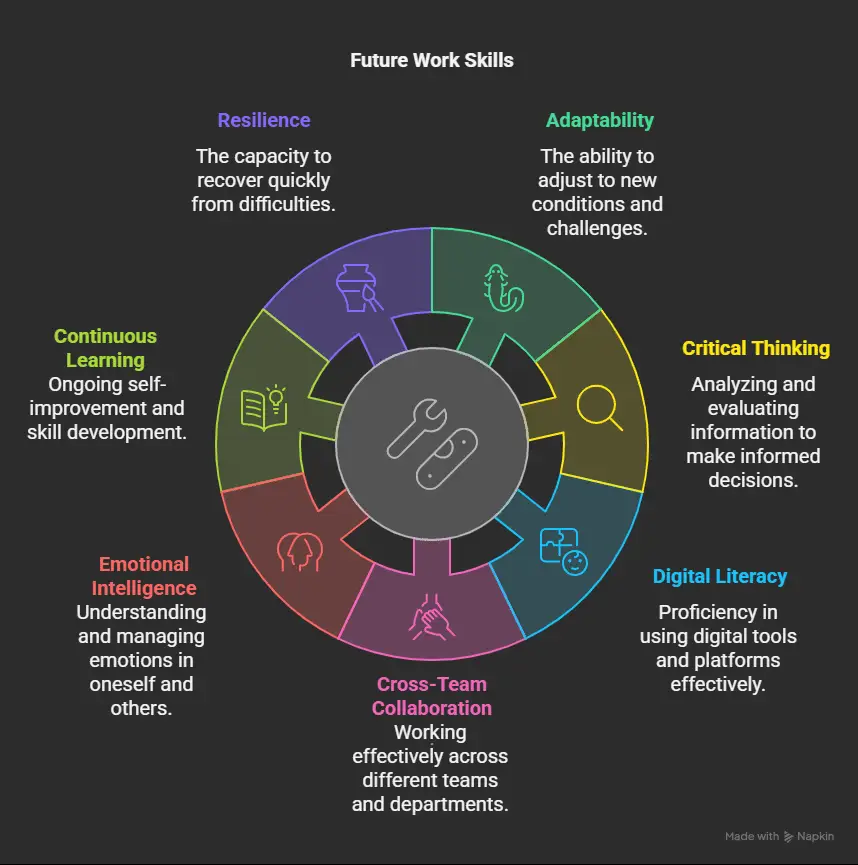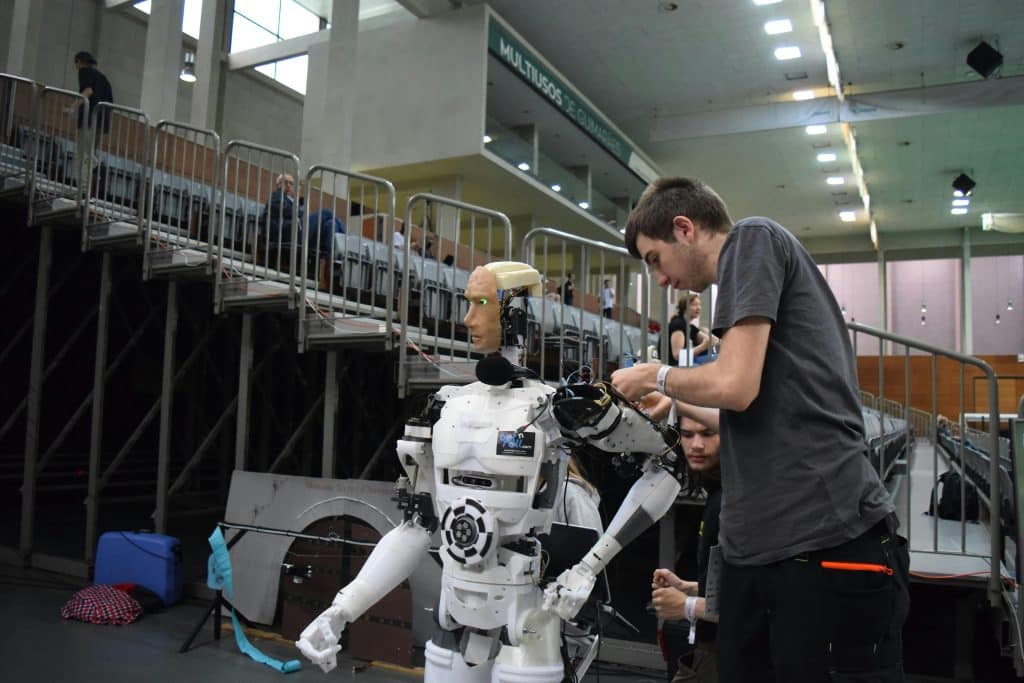I’ve looked into how work is changing quickly. By 2025, 40% of jobs will change due to automation and AI, says the World Economic Forum. This means old job paths are disappearing fast.
Today’s workers need more than just technical skills. They must be adaptable, tech-savvy, and creative. Companies like Google and Microsoft already look for these qualities in their employees.
My research found 75% of employers want workers with hybrid skills. These skills include data analysis, teamwork, and problem-solving. The 7 essential skills for the future of work in 2025 fill these gaps.

Key Takeaways
- Automation will impact 40% of current jobs by 2025, per the World Economic Forum.
- Hybrid skills mixing tech, soft skills, and adaptability are critical for competitiveness.
- Employers increasingly value candidates who master the 7 essential skills to thrive in the future of work in 2025.
- Traditional careers are less stable; continuous learning is mandatory.
- Data literacy and digital fluency rank highest among future of work skills demanded globally.
Also Read: Top 5 Emerging Trends in Education Technology 2025
The Rapidly Evolving Workplace Landscape
Technological changes are changing how we work, bringing both chances and hurdles. To thrive in future workplaces, workers must adjust to new settings where AI and automation change jobs. This change calls for new future workforce competencies that match new trends.
How Technology is Reshaping Career Paths
New fields like AI ethics and renewable energy project management are booming. For example, green energy jobs in the U.S. are expected to jump by 22% by 2030. On the other hand, manufacturing is changing, with a need for skills in robotics maintenance.
This mix shows the importance of always learning new skills.
| Sector | Job Growth (%) | Job Decline (%) |
| Healthcare Tech | 18% | 3% |
| Manufacturing | 5% | 12% |
| AI Development | 45% | N/A |
The Impact of Automation and AI on Employment
Automation might replace jobs that are repetitive, but it also makes jobs that need creativity and human touch better. McKinsey found that 37% of manufacturing tasks could be automated by 2030. But, jobs in healthcare that involve caring for patients are less likely to be automated.
This means workers need to focus on skills that machines can’t do, like making big decisions and understanding people’s feelings.
Why Traditional Career Approaches Are Becoming Obsolete
Old ways of thinking about careers are disappearing as companies value skills over how long you’ve been there. A World Economic Forum report says 50% of workers worldwide will need to learn new skills by 2025. To keep up, people need to be open to learning all their lives and be ready to change their careers often.
Those who stick to old ways risk being left behind in the future job market skills race.
7 Essential Skills to Thrive in the Future of Work in 2025
Job skills for the future need a mix of technical and human skills. Seven key skills for 2025 will help you succeed. These skills connect new tech with timeless professional needs, keeping you ahead.
| Skill | Why It Matters | Key Industries |
| Adaptability | Rapidly learn new tools and workflows | Technology, Healthcare, Education |
| Critical Thinking | Solve complex problems without pre-set solutions | Finance, Engineering, Consulting |
| Digital Literacy | Interpret data and use automation tools effectively | Marketing, Manufacturing, Retail |
| Cross-Team Collaboration | Build cohesive teams across remote and hybrid setups | IT, Customer Service, Startups |
| Emotional Intelligence | Manage workplace relationships amid AI-driven changes | HR, Sales, Leadership |
| Continuous Learning | Proactively update knowledge via micro-credentials | Academia, Tech, Creative Fields |
| Resilience | Handle ambiguity in fast-changing environments | Entrepreneurship, Public Sector, Nonprofits |
These skills are key for 2025’s workforce. Employers want people who are good with data and also have people skills. The skills for 2025 mix innovation with empathy, as we’ll see more of in later parts.
Also Read: 10 Great Benefits Of Online Learning 2025
Technical Competencies for the Digital Era
Workplaces are now all about making decisions based on data. This means having technical skills is a must. These skills are key for handling today’s job roles well. Let’s see how they tackle real-world problems.
Data Literacy and Analysis
People need to dig into data to find trends. For example, doctors use patient data to make better treatment plans. And, store managers look at sales to figure out what to stock more of.
Knowing how to use tools like Excel or Tableau is essential. It turns data into useful information. Websites like Coursera have courses on data visualization to help with this.
Technology Management and Digital Fluency
Using digital tools saves time and cuts down on mistakes. Teams use software like Asana or Slack to work better together. Being good with technology also means knowing how to use new tools to get more done.
Google Digital Garage offers free training to boost these skills. It helps you stay up-to-date with the latest tech.
Cybersecurity Awareness and Implementation
Everyone in a company helps keep data safe. Training from KnowBe4 teaches how to avoid phishing scams. Using two-factor authentication and knowing what to watch out for keeps data safe.
Getting certified in cybersecurity, like CompTIA Security+, shows you’re serious about keeping data secure. It’s important for any job.
Human-Centered Abilities That Machines Can’t Replace
As the future of work skills change, skills like empathy and creativity are key. Machines are great with data but struggle with human subtlety. To thrive in future workplaces, people need to focus on skills AI can’t do.
| Skill | Why It Matters | Development Strategy |
| Emotional Intelligence | Builds trust and resolves conflicts | Practice active listening; study nonverbal cues |
| Creative Problem-Solving | Generates novel solutions | Join brainstorming teams; explore design thinking |
| Adaptability | Thrives in unpredictable environments | Take on new roles; embrace lifelong learning platforms |
| Cross-Cultural Competence | Facilitates global collaboration | Participate in international projects; study cultural norms |
Being able to talk to others is essential. AI can’t match empathy in team talks or with clients. Big companies like Google and Microsoft look for these skills in their employees. They also value the ability to make ethical choices, something AI can’t do.
Improving these skills takes effort. For instance, getting better at handling unclear situations through role-playing helps build strength. Combining human skills with tech abilities makes a person stand out. The future is for those who can balance logic with empathy.
Conclusion: Preparing Today for Tomorrow’s Workplace Success
Getting ready for 2025’s work world means learning the 7 essential skills to thrive in the future of work in 2025. First, check your strengths and what you need to work on. Use tools like LinkedIn Learning’s skill gap analyzer or Coursera’s career guide to find out. Mix technical skills like data literacy with soft skills like creativity to become a well-rounded worker.
Learning never stops. Sites like Udemy or Google Digital Garage have courses on AI and cybersecurity. Workshops on emotional intelligence or project management can also help. Focus on skills that are important for your field, like telemedicine for healthcare workers or AI analytics for marketers.
Begin with small steps but keep going. Set aside time each week to learn new things and use apps like Trello or Notion to track your progress. Join groups like IEEE or local tech meetups to learn about new tools and trends. The sooner you start, the better you’ll be prepared for 2025’s opportunities.
FAQ
What are the 7 essential skills to thrive in the future of work in 2025?
The 7 essential skills include data literacy and analysis, technology management, and digital fluency. They also include cybersecurity awareness, emotional intelligence, and creative problem-solving. Other skills are ethical judgment and interpersonal communication. These skills are key to navigating the changing job market and being ready for work.
Why is it important to focus on future skills for the job market?
Focusing on future skills is important because technology and the economy are changing careers. Knowing these skills for 2025 prepares me for new opportunities and challenges in the workforce.
How can I develop workplace readiness skills?
To develop workplace readiness skills, I need to keep learning, get certifications, and gain experience. I can do this by taking workshops, online courses, and networking with professionals in my field.
What role does emotional intelligence play in the future workforce?
Emotional intelligence is becoming more valuable. It helps in understanding workplace dynamics, building teamwork, and improving relationships. In a tech world, our emotional skills give us an edge in the job market.
How can I stay updated on future job market skills?
To stay updated, I can subscribe to industry newsletters, go to conferences, and follow leaders on LinkedIn. By engaging with relevant content, I can keep up with new trends and skills.
What strategies can I use for career advancement in the evolving work landscape?
For career advancement, I can work on a diverse skill set. This includes both technical skills and human-centered abilities. Seeking mentorship, taking on new projects, and embracing lifelong learning are also good strategies.
Are technical competencies essential only for tech jobs?
No, technical competencies are becoming essential in all industries, not just tech jobs. Skills like data literacy and cybersecurity awareness are important in roles like management, healthcare, and finance.


 Owner of Write Remotely. Connecting businesses with talented writers and empowering remote work.
Owner of Write Remotely. Connecting businesses with talented writers and empowering remote work.

